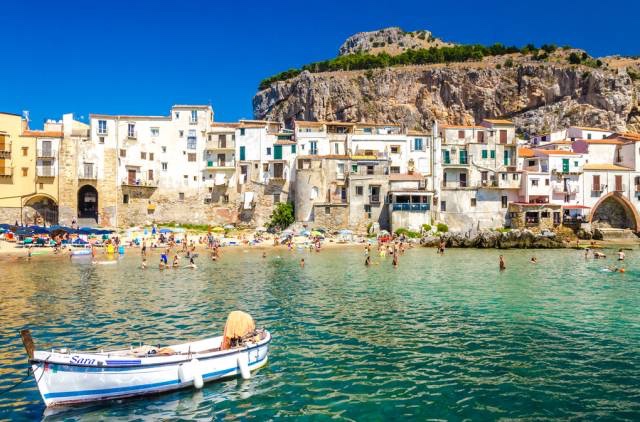Mediterranean history - under the volcano
地中海的历史-于火山下
The Invention of Sicily. By Jamie Mackay.
《西西里岛起源》杰米·麦凯
Sicily beguiles. It offers coves with limpid water; Greek temples, such as those at Agrigento and Segesta, that are among the best preserved in the Mediterranean; a Roman amphitheatre at Taormina still used for its original dramatic purpose; grandiose Baroque palazzi; bustling street markets; some of the best food to be had in Italy; an expanding range of fine wines at reasonable prices; and a cathedral in Palermo that is a riot of eclecticism. Etna on a spring morning, still capped with snow and belching smoke, is among Europe’s greatest sights.
西西里令人着迷。它有清澈的海水;有希腊神庙,地中海保存最完好的就位于阿格里琴托和塞格斯塔;有罗马露天剧场,陶尔米纳的那个剧场仍保留了最初的戏剧用途;有宏伟的巴洛克式宫殿;有熙熙攘攘的街市;有意大利一些最好的食物;有品种繁多且价格合理的优质葡萄酒;有位于巴勒莫融合了各种折衷主义设计的大教堂。春天的早晨,埃特纳火山仍被积雪和薄雾覆盖,这是欧洲最壮丽的景观之一。

The ancient Greeks saw Sicily as rich and fertile yet “dangerous and unpredictable”. For Jamie Mackay, author of this brief and pacey history of the island, their perception reflected a dual view of Sicily that would be expressed in different forms up to the present day. In Mr Mackay’s telling, a tipping-point arrived at the dawn of the 14th century after several hundred years of relatively enlightened rule by Byzantine Greeks, Arabs and Normans. The uprising that came to be known as the Sicilian Vespers sparked a war that led to the expulsion of the island’s French rulers. But it is only too characteristic of Sicily’s ill fortune that this popular victory should ultimately have had such dismal effects.
古希腊人认为西西里岛是个肥沃富饶之地,但它“危险且不可预测”。杰米·麦凯讲述了这座岛简短而充满活力的历史,在他看来,他们的这种想法反映了人们对西西里岛的双重看法,这种看法直到今天仍以不同的形式表现出来。麦凯先生讲述道,经过拜占庭希腊人、阿拉伯人和诺曼人几百年相对开明的统治之后,一个转折点出现在14世纪初。后来被称为西西里晚祷的起义引发了一场战争,导致岛上的法国统治者被驱逐。但是,这场人民的胜利最终竟产生了如此令人沮丧的后果,这正是西西里岛不幸的典型。
Sovereignty over an ethnically and religiously diverse island passed, via the rulers of Aragon and Catalonia, to those of a newly unified Spain, obsessed with confessional uniformity and, by implication, racial purity. Sicily became an outlying territory in an empire that favoured traditional social arrangements and a profoundly conservative form of Catholicism. For almost 400 years, Mr Mackay notes, Sicily had been governed by an urban elite in Palermo. “Following the Vespers, though, power moved progressively away from these individuals, and into the hands of rural landowners and church authorities.”
主张种族和宗教多样化的时代已经过去,从阿拉贡和加泰罗尼亚的统治者,到新近统一的西班牙统治者,都痴迷宗教统一,也暗中追求着种族纯洁性。西西里岛曾是罗马帝国的一个边缘地区,那时帝国偏爱传统的社会制度和极度保守的天主教组织。麦凯指出,近400年来,西西里一直由巴勒莫的城市精英统治。“然而,晚祷起义之后,权力逐渐从这些人手中转移到了农村土地所有者和教会权威的手中。”
译文由可可原创,仅供学习交流使用,未经许可请勿转载。












